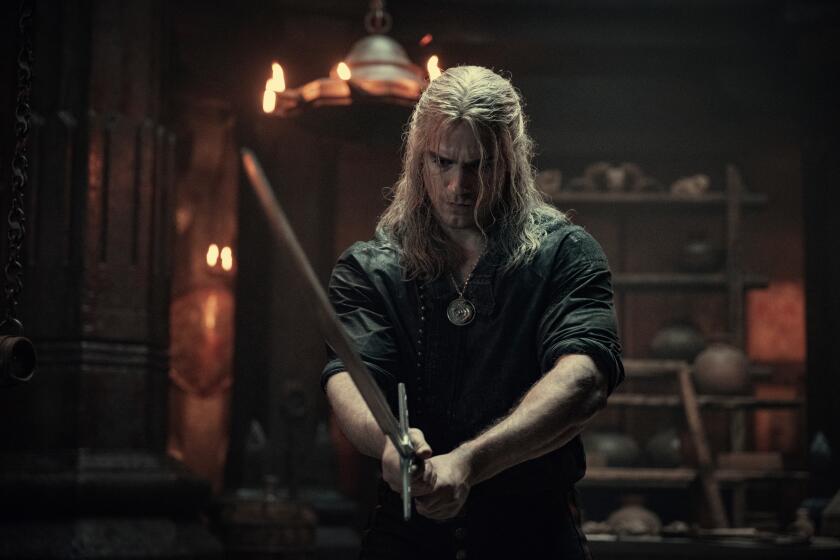‘Breaking Bad’ recap: A walk in the woods
“Breaking Bad” is the story of Walter White. That seems obvious, of course. Bryan Cranston is at the center of nearly every episode, and he’s the guy who’s won three Emmys for his work as its lead character. But where many TV shows that run five seasons expand and expand, incorporating a larger understanding of their own worlds, “Breaking Bad” has honed itself to a fine point. As other stories and characters fall by the wayside, as all of his excuses and rationales prove hollow and false, there’s still Walter White, sitting alone in a cabin in the New Hampshire woods, with two copies of “Mr. Magorium’s Wonder Emporium” for entertainment and only his own thoughts to keep him company. And those thoughts must make for rotten houseguests.
There’s no way around this: “Granite State” is a weird, weird episode, filled with odd structural choices and some leaps in character motivation that typify some of the problems the final season has had in making all of its character arcs count. It’s also an episode that finally tips Jesse Pinkman’s storyline over into something like misery porn, simply forcing him to stare at one terrible thing after another, while making that open, weeping face that Aaron Paul does so well.
Yet at the same time “Granite State” is starkly brilliant. It cast a pall over the rest of my evening, but in a way that was wholly intentional, I think. It’s dark, uncompromising television, and if that occasionally results in story moments that feel placed there to punish the characters and audience, it also results in the brilliance of Walter slouching alone into a small-town bar and trying to win his son back to him over a long-distance telephone call.
GRAPHIC - ‘Breaking Bad’ to ‘Justified’: Killing off your favorite stars
I said a couple of weeks ago that Hank’s slapping the handcuffs on Walter’s wrists, only to be interrupted by Uncle Jack and friends, was the end of “Breaking Bad’s” plot. Basically everything that needed to happen to close out the plot had happened in that moment. But the story kept going. It had to. Walter kept making it go, kicking at it and screaming at it and refusing to let well enough alone. The last three episodes exist in the shadow of that certainty. “Breaking Bad” is as intent as any show since “The Sopranos” on making its audience realize the monstrous man they’ve been watching all along. Even when Walter seems like he’s going to turn the corner and do something good for a change, it gets warped and twisted by the evils contained within him. “Granite State” strips away every last bit of cover Walter had for his evil, then proudly stomps it into the dirt. It’s hard to watch. It’s also necessary.
As “Granite State” begins, Walter continues to argue that everything he’s doing is for his family, but the longer the episode lasts, the more that lie is exposed. His family wants nothing to do with him. He’s ruined all of their lives. Marie is a widow. Skyler is in severe legal trouble and trying to make ends meet with a job at a taxi company, to say nothing of the way Todd and his crew are able to slip into her house under cover of night and threaten both her and her children. And most gut-wrenching of all, when Walter calls his son at school to say he’s sending a $100,000 care package, Walter Jr., wants nothing to do with him, blaming him for killing Hank and wanting him out of their lives.
Walter prepares to turn himself in to the authorities, then sees Gretchen and Elliot -- who cut him out of a fortune at Gray Matter and formed an important part of the series’ backstory -- on the “Charlie Rose Show,” and as they talk about how Walter gave very little to the company other than its name, the familiar look crosses his face. But this time, there’s no Heisenberg to hide behind, no hat to shove down atop his head. It’s New Hampshire, and it’s cold. But there’s still the bottomless reservoirs of rage and self-pity Walt draws upon. There’s still his pride. And so he leaves his drink on the bar, heading back to Albuquerque for whatever fate awaits him.
PHOTOS: Walter White, Dexter and really good bad guys
Before we return to Walter, however, I need to roll back to what I continue to find the biggest misstep Vince Gilligan and company have made in this final season. (And remember that we’re talking about “Breaking Bad” here. This is a show that turns even its missteps into fuel to become even better.) The story of Todd and Lydia is OK, as these things go, but it continues to feel slightly too much like an object lesson in how the meth trade isn’t full of wacky scrapes that good buddies like Walter and Jesse are able to get out of, nor is it full of such over-the-top, colorful figures as Mike and Gus. The meth trade tends to attract ruthless people, whether they couch their ruthlessness in a perfectly balanced bottom line or being willing to plug an innocent woman in the back of the head to intimidate a meth cook who’s gone rogue.
By rubbing our noses in this, the show seems to be saying that Walter unleashed forces he was unable to comprehend, that he was inevitably going to end up working with these sorts of people. And that’s fine as far as object lessons go. But the more the show tries to actually get me to invest in Todd and his overprotective adoration of Lydia (like how he picks a stray bit of something off her shoulder after their meeting tonight), the less I understand what the point of it all is. The emotional fallout of everything that’s happened elsewhere is so much greater, and the show doesn’t need to particularly humanize the people who keep Jesse imprisoned or break into Skyler’s home at night. It’s fine if the series wants to have characters who are a means to an end -- a way to show us the true depths of darkness that Walter has bathed himself in -- but there’s nothing beneath that darkness, just emptiness, which is not something strong enough to drive a whole scene. The Todd and Lydia scenes feel dramatically inert; at least Uncle Jack has the decency to be a cartoonish over-the-top supervillain.
And yet as I think about this particular story turn and how I don’t like it, the more that I come to realize how they represent the physical manifestation of the story’s “hero” being in absentia. With Walter off in New Hampshire, the Nazis spread like a virus, impervious to anyone who would harm them. It’s not that Walter can keep them in check; it’s that the series has always treated its external threats as extensions of Walter’s internal psychological workings. Now that he’s gone, the bleakness that consumed him whole spreads outward from the rotting source. The foundation cannot hold. Or put another way: Saul tries to tell Walter that the only way he can stay true to his goal of protecting his family is to stay put in Albuquerque, even as Saul himself has decided to hightail it for a new life in Nebraska. The only way to stop the bleakness of Walter from infecting all it touches is for Walter himself to face it down. Without him there, it doesn’t matter how many cops are posted outside the White home. The decay sets in.
WATCH: Video chat with ‘Breaking Bad’s’ Aaron Paul
Think of the first time we see Walter in this episode, on a tiny monitor as Saul watches him in the lobby of the vacuum repair guy’s shop. (Said vacuum repair guy/disappearer is brilliantly played by the wonderful character actor Robert Forster.) He swats angrily at a light fixture, like a caged predator who’s been shot with a tranquilizer dart that just wouldn’t take. He wants there to be an escape. He wants there to be a solution. But there is no way out. There’s simply the continued existence of the tinier and tinier box he paints himself into. Look at the way whole months slip out from under him when he sits alone in his cabin, the way he has to pay the vacuum cleaner guy to be his friend for but an hour. He is alone, and he is dying, and the only company he has are thoughts he’d much rather dismiss. Walter White goes back to Albuquerque, in the end, not to face down his demons or try to become a hero. He goes back because this is his story, and it must end with more explosions and more death. He doesn’t know any other way.
ALSO
‘Breaking Bad’ recap: Walter’s world crumbles
‘Breaking Bad’ recap: Scales falling from Walter’s eyes
Emmys 2013: ‘Breaking Bad,’ ‘Modern Family,’ ‘Behind the Candelabra’ win top awards
Todd VanDerWerff
https://twitter.com/tvoti
More to Read
The complete guide to home viewing
Get Screen Gab for everything about the TV shows and streaming movies everyone’s talking about.
You may occasionally receive promotional content from the Los Angeles Times.






